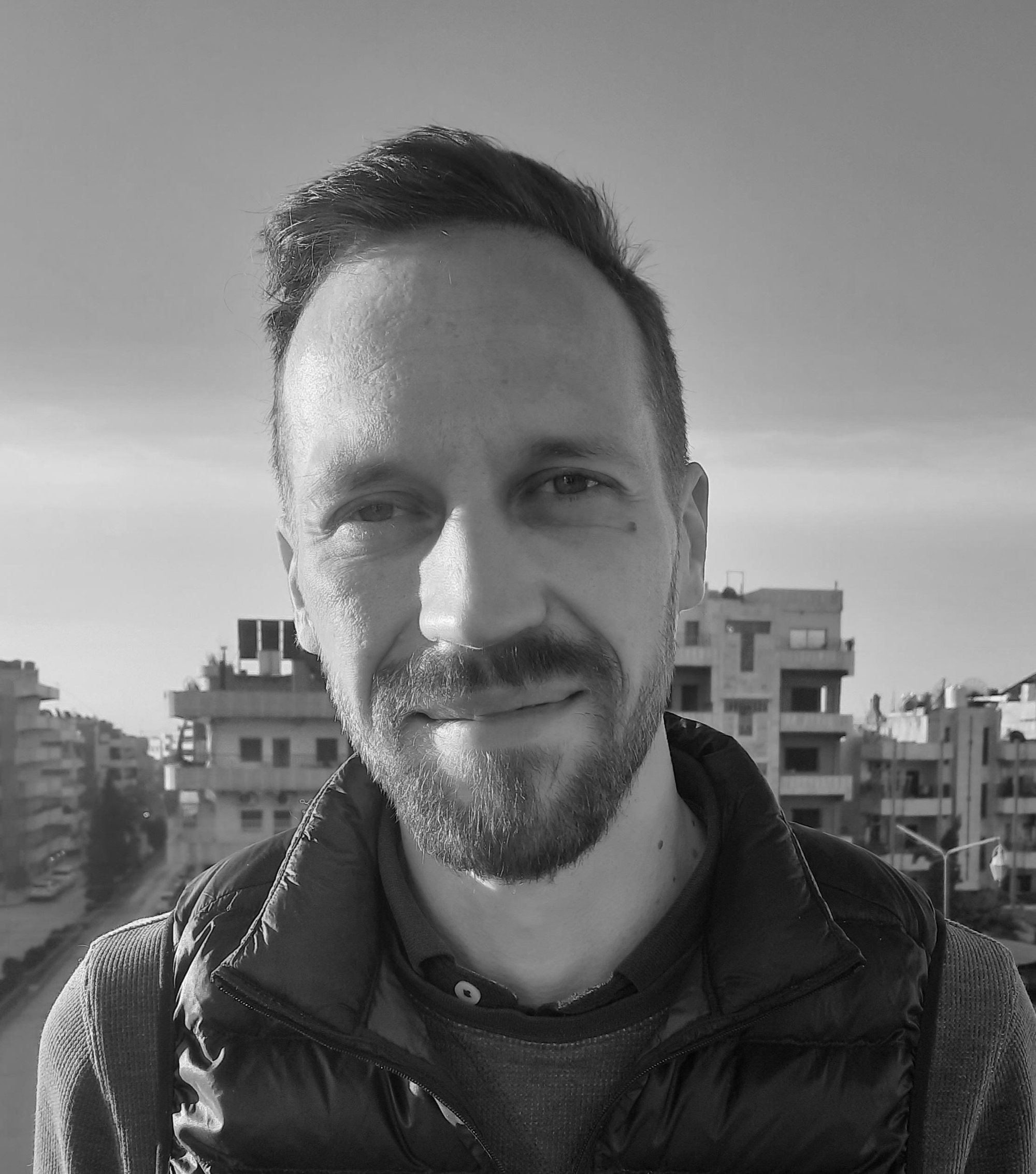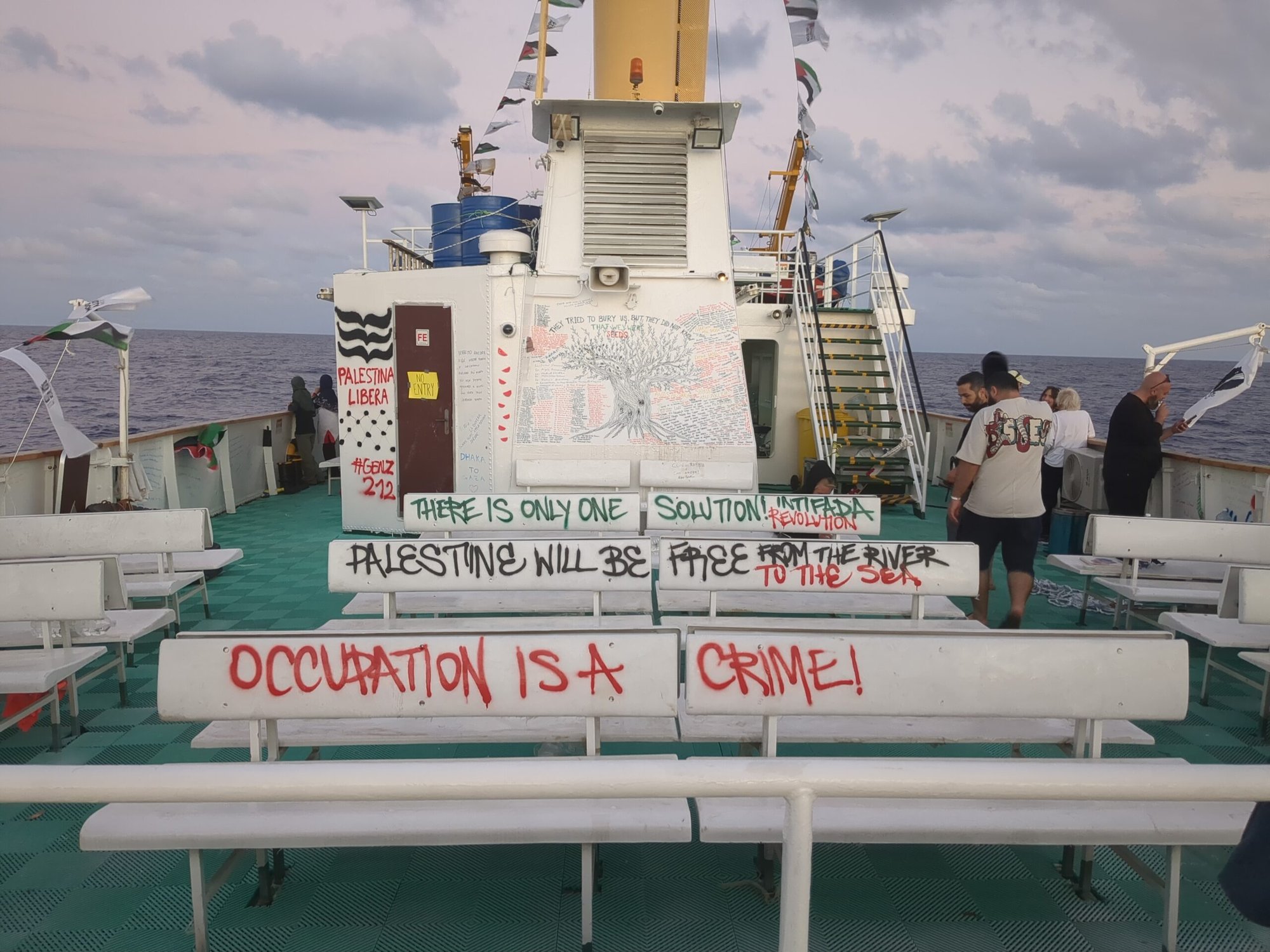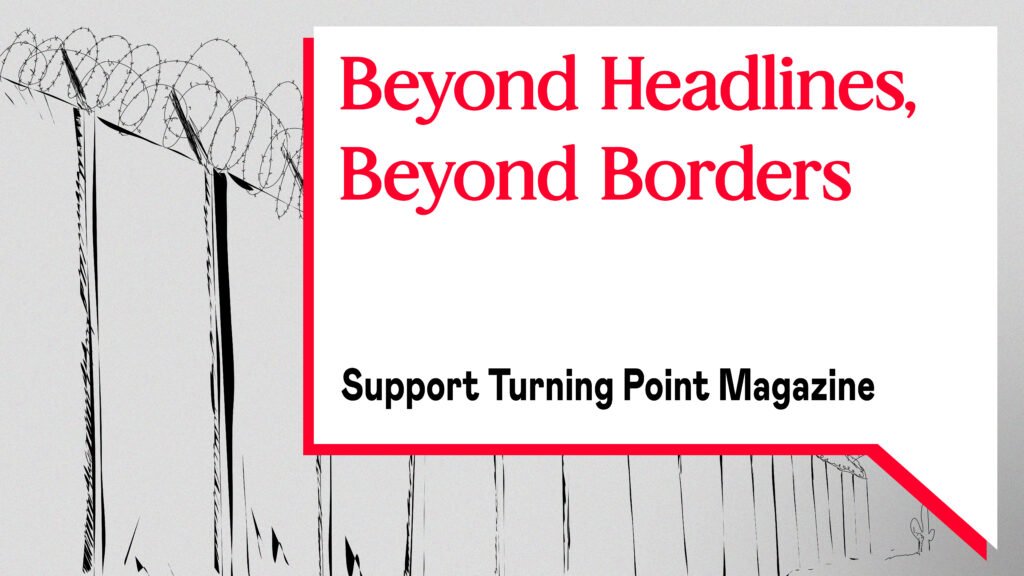Cover photo: Conscience, October 4, 2025. New graffiti appeared on the upper deck each day. ©Henri Sulku
The following is a chapter from a diary chronicling Conscience’s voyage with the humanitarian flotillas in October 2025, the fourteenth month of the genocide. Written in the form of an itinerary tale, it offers a first-hand glimpse into international medics and journalists’ naval attempt to break the siege of Gaza, plunging the reader into uncharted waters where the compasses of conflict journalism, a freedom struggle, and human conscience seek a common orientation. The diary will be published in its entirety next year. (The author works as an editor at Turning Point.)
Twelve Sweltering Hours
As we were herded into the ship’s restaurant area, the sun had just climbed above the horizon. It was 7 am or so, Wednesday, October 8, and all of us knew that soon the room, a large steel chamber with wide glass windows, would start trapping heat like a greenhouse. With one hundred people crammed inside, we would have a long, tiring day ahead. The oldest of us, Isaline, 83, was already showing signs of strain, and we had several other members in their seventies.
For them the heat could be fatal, I thought.
It was soon understood that the hijackers’ orders were to treat us decently, whatever that meant per local standards. They offered water, food, and medical assistance, and made sure to have their PR guy—a designated gunman with professional camera gear—always nearby to capture these gestures on film. There was a general refusal of offers of such kind.
Our trainings had warned us of the likelihood that the Israeli navy would craft a “documentary” clip of the hijacking to polish its image on the global stage. Nobody wanted to play a role in such a propaganda ploy, least for an army which used starvation and the denial of water and medical aid to engineer a genocide.1
But it did seem like people wanted to test how far it was possible to push to improve the conditions on our boat which by now had turned into a makeshift prison ward.
Within half an hour, the first demand emerged: visits to the restroom.
“Later,” the guards’ commander replied, furrowing his thick, dark eyebrows into a theatrically stern expression under his mask. Judged by his physique and manner, he was somewhere in his mid-twenties.
“Be in your place. Be silent. And later you will go to the toilet,” he said, and a nervous silence fell into the room.
Someone in the back started hymning Bella Ciao. Others joined. The soldiers exchanged confused glances, and the hymning grew louder as more and more people joined the chorus.
Pressure mounted on the guard commander. He was still young enough to repeatedly look for his superiors’ validation, yet old enough to be visibly insecure about his authority over the 18- to 20-year-old cadets. The situation was slipping out of his control.
“Stop it!” he screamed abruptly, rattling his assault rifle with his right hand. His gaze, still theatrically fierce, betrayed emotion for the first time: anger and panic flickered in his eyes.
The hymning stopped. People smiled. The officer’s authority was tarnished, irreversibly.
The atmosphere eased noticeably, and chats started erupting in all corners of the room. Some started creating improvised beds from their life vests. Fully opened, they made an eight-centimeter-thick styrofoam mattress just long enough to cushion a spine. Not exactly comfy, but roughly on par with the hard deck or thin yoga mats we’d slept on all week.
As the resting arrangements were fixed, the question of heat took center stage. Sour locker room odors were already creeping through the room, and also the guards grew visibly uncomfortable. They restlessly shifted their weight from one foot to another and fumbled with their masks to wipe off sweat from their faces. Dark, wet stains spread in their olive green uniforms around arm pits, belts, and vests.
The commander on shift eventually asked our captain to turn on the ship’s air conditioner. It didn’t work. All of us knew that.
Someone suggested fetching two large fans from the lower deck, the ones we normally used to cool the sleeping quarters. The proposal was approved, and soon the fans, a meter wide each, were blowing much needed fresh air to the restaurant. The temperature dropped instantly despite the junior officer stationing himself in front of the second fan.
“You are blocking the air,” someone shouted. He moved himself a step or two. The heat was still tiring, but no longer fatal.
The restroom visits began in small groups, four or five at a time with two armed guards. Someone brought a large pot of boiled eggs, easily 100 or more. Nobody touched them, as far as I could see. More people fell asleep. Some prayed.
Judging by the mood, the conditions had improved enough to lower the level of conflict and rest. We would spend at least eleven more hours in the room, assuming we kept full speed. Peeking through the window, I saw a handful of Zodiacs and a corvette escorting us at a steady pace. The sea was calm and sunny, untroubled by the night’s crimes. I hadn’t slept for 24 hours, and it seemed an opportune moment to recharge.
I, too, turned my life vest into a mattress.
Soon after, I woke to the sounds of an argument from the far side of the room.
“Sit down!” one of the masked gunmen shouted at one of our medics.
I didn’t know the cause of the dispute, but guessed she had tried to see someone in need of medical attention.
“He will see our doctor,” said their shift commander, coming to a wrestling distance from our medic.
The guards had changed shifts while I fell asleep, and the new officer on duty was slightly taller and sturdier than the earlier, but around the same age. He did not strike me as insecure as the first one.
“I am going with him!” our medic insisted. “We have dozens of doctors with us, he has no need to see your doctor.”
“Sit down!” the commander shouted louder, and pulled a taser from his hip. Our medic gave up her effort and sat down.
As the situation calmed down, I fell asleep again, only to wake dehydrated shortly after. I scanned the room to be sure they weren’t filming, and swallowed a mouthful of water—our water. I tried to sleep again, but the same cycle repeated, again and again.
Around 1 or 2 pm, finally coming out of the dehydrated half-sleep, I spotted for the first time an older man who seemed like their highest-ranking officer onboard. Unlike the others, he did not carry an assault rifle or wear a combat vest, but had a pistol on his belt and a light blue civilian cap in his head. He was calm and composed, guiding from behind rather than commanding from the center. In the circumstances, those were all signs of senior status.
After our earlier failure to provide medical care at will, the negotiations resumed with new bargains. Someone asked to go for a smoke on the deck, and the man I took to be their top commander said something in Hebrew to the junior officers.
“You can go to smoke in small groups,” the shift commander said in English.
I was assigned to the second group and soon found a bunch of gunmen loitering on the deck. One of them was ripping off “Freedom Flotilla” window coverings that dimmed the storage room. Another one had spray-painted over the graffiti that decorated our deck. Some were looting our canteen, at least for pasta, rice, and other dry products. And a small group inspected the boat’s smokestack which rose into a small mast or an antenna. They seemed to want to plant an Israeli flag there.
Halfway through the cigarette, I approached the squad commander on the deck. We were instructed not to chit chat with our captors, but the journalist within me wanted to test the ice if I could get some information out of them.
“So are you all from the Navy?,” I asked with a casual tone, glancing at the soldiers gathered further away.
“I cannot tell you,” he replied with a toneless voice and a face without expression. It was clear he wouldn’t talk.
Another detainee continued with a somewhat bitter but sincere inquiry. “So how do you feel when, after two years, you have completely ruined the image of your country?”
The soldier’s eyes turned fiery as he paused for a second to come up with a response.
“In the last two years,” he said at last, “we have proven to the world that we are the most kind and humane army in the world.”
His voice broke slightly as he struggled to contain an emotion; I couldn’t tell if he was angered or hurt by the question. I wasn’t sure if he could tell either. Nevertheless, his answer threw me off balance.
I had expected something along the lines of “we were attacked by terrorists, and we did what was necessary to defend ourselves regardless of what others may think.” Or some kind of “necessary evil” argument, something about “unavoidable collateral damage,” or any of the other playbook excuses for atrocities I had heard countless times growing up at the peak of the post-9/11 War on Terror propaganda.
But he was not going for that line. His image of his employer, the Israeli army, struck me as so dissociated from its documented genocidal conduct that I had no tools to bridge the seemingly tremendous gap between our perceptions of reality.
I let the conversation die there, tossed the cigarette butt, and moved back inside where the sweltering heat and looping toilet queue continued. With only four working toilets, escorting one hundred people at gunpoint meant that when the last group returned, the first was already lined up again.
Around 5 pm, I made my own toilet visit, and on the way back, the guard instructed me to bring my stuff to the upper deck. I grabbed my backpack which looked untouched. We clearly started to be near Israel if they wanted us to start collecting our belongings.
I remembered I had left my sleeping bag in the storage room which now served as an isolation cell for our separated members. I asked to fetch it to have an excuse to check the situation there. Ali, Huwaida, Noa, Nikita, and Vincenzo were there, all laying on the floor, every other handcuffed or zip-tied. They all looked absolutely worn out, but generally in shape considering the circumstances.
“Are you good? Do you need medical assistance?” I asked in a low voice, worried a discussion might provoke a punishment—to them, not to me. I received shy, reassuring smiles in return. Omer had been brought there as well.
Probably because of his Israeli citizenship, I thought.
The dusk had just begun falling when the tower blocks of Ashkelon came into view to our starboard. It would take only an hour or so to Ashdod, and I signed up once more for the toilet queue.
This may be the last chance for a while, I thought. From the experience of the Global Sumud Flotilla, we knew that our treatment would change as soon as we got our feet on solid ground.
“In the port, they will be much worse,” one of the navy soldiers had told some Sumud detainees, and the detainees’ later testimonies corroborated his insight. It was in the port of Ashdod that Sumud participants were held like cattle, forced on their knees for hours to listen to the Israeli minister Itamar Ben-Gvir’s sadistic insults. There were no signs our treatment would be any different, for better or worse.
As we neared Ashdod, around 7 pm, the soldiers brought a big leather suitcase filled with passports, different nationalities tied with rubber bands in their own stacks.
“Now, when we shout your name, you will pick up your passport and move through the [starboard] side of the deck. You will move one by one, in line, to the [rear] deck,” the commander on duty shouted.
“There will be soldiers at every step,” he added. “No funny business!”
My turn was somewhere halfway down the list. As promised, the path to the rear deck was lined with soldiers. There was at least a combat-cabable platoon, thirty or forty of them, still onboard. I walked through the starboard aisle, the same stretch where I had been admiring the silver moon and the copper orange glow of Port Said when the interception began.
Now, when I looked over the same bulwark, I only saw rows of Israeli flags—dozens of them flying upon an evening breeze from the sea. We were in an undistinguished industrial port, and a crowd of two dozen border guards paced restlessly at the dimly lit berth waiting for us. Hebrew pop music blared at full volume.
A few more steps, and I saw a blonde woman from our boat—I couldn’t quite recognize who—walking the boarding ramp to be immediately swallowed by the crowd onshore. An officer forced her head down, and she completely vanished inside the fray.
Some seconds later she popped out from the other side of the melee, flanked by two border guards. One pulled her by the hair, wrenching her head at an unnatural angle and forcing it towards the ground. The other twisted her arms in a stress position behind her back.
She stumbled as they frog-walked her towards a concrete square at high march speed. Some ten hostages were already there, herded between Israeli flags, kneeling down and facing the concrete in a grotesquely staged performance which instantly reminded me of ISIS’s execution videos.
The soldiers next to me laughed. They had noticed that I had noticed. It seemed to amuse them.
“Welcome to Israel,” one of them said, and they continued laughing.
Unimpressed, I continued walking.
“Welcome to Israel,” one of the young conscripts repeated a few steps away as if he just wanted to know how it felt. A boy by every measure, his eyes were sparkling like he was on his first ride on a motorbike. He looked me directly in the eyes, and soon blinked away.
I imagined all this must be one of his fumbling baby-steps into a potentially bottomless spiral of cruelty, brutality, and abuse—one that would inevitably close in on the Palestinians. It wasn’t even a proper baptism in fire, but mere mindless barbarity in front of unarmed civilians.
Born in a state with a conscription army (and being a conscientious objector myself), I was suddenly saddened by his fate. For a moment, I felt the weight of propaganda and social pressure and the seductions of masculine violence and power—all those sticks and carrots of my own disoriented adolescence—on my shoulders.
But it was time to brush these emotions aside. Approaching these armed teenagers as victims of their parents’ apartheid system shall wait for more peaceful circumstances. For now they were our captors, tiny cogs in a vast machine of mass destruction. The genocide was grinding on, and our own ordeal had merely just begun.
A handful of people, and I would be next walking the ramp, likely into some days of internment in one of their prison camps.
As I watched our people being manhandled out of the ship, another unexpected sadness gripped my chest upon realizing I might never see Conscience again. Already in her twilight years, she had sprung to action in humanity’s hour of darkness, outfitted for this daring humanitarian mission by Mavi Marmara martyrs’ families. She had survived a missile strike herself, and—her hull still bearing its fresh scars—she crossed the Mediterranean, shielding us from salt and sunburn.
At this point, Conscience was not only a ship, but an organization, a community, a vision—a legacy of past sacrifices and a promise of future freedom. An Israeli flag now flew on her, atop the smokestack which rose into a small mast or an antenna, as she was chained like a circus animal to the undistinguished, dimly lit berth.
But her story wouldn’t finish yet, not until her promise was redeemed.
- For the use of starvation and denial of water and medical aid as acts of genocide, see the UN report Legal analysis of the conduct of Israel in Gaza pursuant to the Convention on the Prevention and Punishment of the Crime of Genocide, pages 15-16, 35-41, and 57-61. ↩︎

Henri Sulku
Henri Sulku is an editor of Turning Point, where his work centers on political economy, people’s history, and resistance movements.




